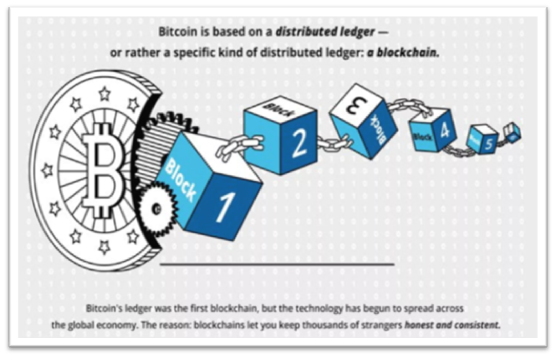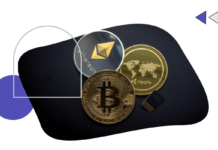Technology moves fast, and in the process, it brings a lot of change in the traditional ways of doing things. If you have been following technology news, especially the advent and usage of bitcoins, you must be familiar with the term blockchain technology. This record-keeping technology is behind several other services such as banking, investment, cryptocurrency, and even education. Smart schools and smart classrooms are not very far in the future now, and blockchain technology might be a vital step up in this direction.

What is Blockchain?
We shall begin by explaining what blockchain is. We can define blockchain as “a distributed, decentralized, public ledger.” The ‘blocks’ are the digital pieces of information that are stored in a database, publically accessible (chain). Blocks have three parts:
- Stores information about your recent purchases, such as date, time, and payment.
- Stores information about the buyer (the one who made the transaction at a given specific date and time).
- Stores information for ‘hash’ that distinguishes one block from the other.
Typically, one block on the blockchain can withhold upto 1 MB of data.
How does it work?
As the name depicts, blockchain is made of several blocks that are slung together. Whenever a blocks stores new information, it automatically adds to the blockchain.
There are four steps to this process:
- A transaction must take place.
- The transaction must be verified.
- The verified transaction must be stored in a new block.
- A new hash must be given to the block.
The data that is stored in a blockchain is then publically available and accessible.
Uses of Blockchain
Several institutions are using blockchain technology for storage purposes. It is a reliable way to store information such as transfer of property, votes in elections, and even monetary transactions. Therefore, more and more users are exploring this technology for its practical applications. These include banks, cryptocurrency, health users, property businesses, smart contracts, and education.
Blockchain in Education
Education is a sector that is the backbone of any country and is as important as healthcare and banking. Edtech market is snowballing, and there is an estimated $93.76 billion that it will reach by the end of 2020. With the new skills that are required in today’s market, coupled with the competition, the education sector needs to modify as soon. The education sector is already using tools to maximize the results, such as virtual reality and artificial intelligence. Smart classrooms are not a thing of the future now, and blockchain technology will be a vital part of this transformation.
There are several ways in which blockchain has changed or improved education. Have a look at our list of areas that have refined as a result of this technology.
- Learning and Test Preparation
Blockchain technology eliminates the need for an intermediary in the process. Disciplina is the first-ever platform that uses the technology and employs it for use in recruitments and education only. Opet Foundation’s chatbot app is another platform that helps students to prepare for tests and exams. Students can ask questions, and it will refer to different sources.
Additionally, it also keeps track of the student’s learning record and assists them in the next sessions accordingly. Several services are providing some of the best dissertation writing services, where they employe people to search for resources. Blockchain technology can assist a student in writing a thesis and dissertations.
- Record Management
Minimizing the use of paper-work in the process reduces the chances of fraud, thus increasing the scrutiny and transparency of the process. DLT (Distributed Ledger Technology) improves the efficiency of the process and also provides speedy services.
- Eliminating Fake Diploma Fraud
Since blockchain is more efficient and transparent, it will upset the nature of contracts in all sectors. It is virtually impossible to hack or recreate since many versions of the registry are open on computers around the globe. It will practically diminish the chances of fraud in academia and academic degrees.
- Reducing costs
The idea that blockchain technology will eliminate the need for an intermediary can bring forth favorable results in financial aspects. For example, in higher education, it will reduce administrative costs. Also, the process of verification will become much secure and open.
- Blockchain Degrees
Not a thing of a far off future, these are very much the thoughts that people in higher education are contemplating. It will help the higher education sector to establish a system by which they can validate a student’s knowledge. The students will be able to access a publically accessible registry of qualifications.
- Human Resources
Blockchain would make the job for HR professionals easy and secure. For example, if employment and criminal records are stored in a DLT, then it will be easy to choose the right candidate for the job. Schools and colleges can use a similar system to create a marketplace for summer activities. It will easy for people looking for work and also easy for the hiring team to process quickly.
- Libraries
Libraries can build a metadata archive by using DLT. These can develop a protocol and support community-based services. The data available online will become a marketplace for students.
- Students’ Records
Blockchain can be used to store and share student’s records. For example, Sony Global Education has built a system in collaboration with IBM that provides similar services to various educational institutes. The system and the process can get extensive as well as expensive due to the magnitude of data.
The Future of Blockchain in Education
The technology is perfect for storage, sharing, and networking purposes, securely. Processes can become faster, smoother, and safer. Students will soon find themselves exploring many other uses and benefits of this technology, which is already helping the banking and health. If you are looking to start your career in Blockchain then Bsc in Business Analytics could be your best choice to start with as this will help you gain from both technical and business end.
Future of Cryptocurrency amid and after Covid-19
The world has witnessed a global economic crisis though the Crypto world. Bitcoin has seen its lowest ($4944) ever on March 17, 2020, after the Crypto boom. To understand what does a global pandemic mean for cryptocurrencies we need to have patience and wait till the time this hard time passes.
Practice social distancing, stay safe, be good. Good luck!







